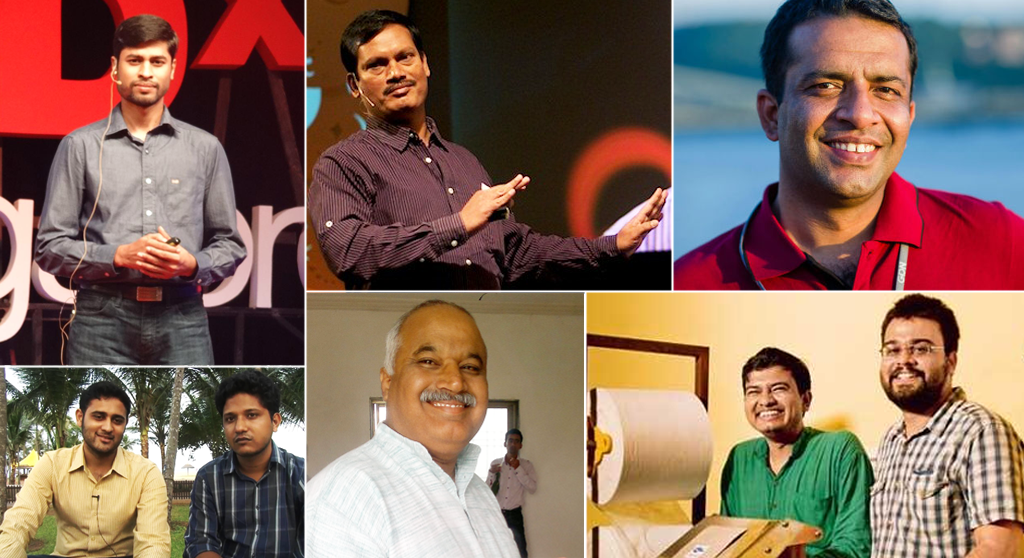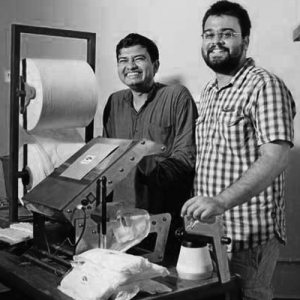Men Who Are Fighting Menstruation Taboos In India
In a country where millions of women still do not use sanitary napkins, May 28—or Menstrual Hygiene Day—is a good reminder of the regressive attitude that still exists towards a normal female bodily function.
Out of ignorance and poverty, nearly 70% of Indian women use old rags, increasing the risk of reproductive diseases. This is partly because of the shame and stigma associated with menstruation in India. Women are often forbidden from entering kitchens and temples, touching certain food, or watering plants during their periods. And, it is not just Indian women who believe that periods are a taboo subject: Most Indian men find buying a sanitary napkin more embarrassing than buying a condom.
But then, there are a handful of men who are not just fighting these stereotypes, but also trying to improve the menstrual hygiene in India. Quartz brings you six Indian men who are set on making the monthly cycle acceptable in Indian households.
Tuhin Paul
 For his final project at the National Institute of Design, Tuhin Paul, and his then batchmate and now wife, Aditi Gupta, created a comic book in 5 regional languages and 2 to educate schoolgirls about menstruation. But funds were scarce and their reach limited. That led the couple to develop an online encyclopedia on menstruation, called Menstrupedia, on a shoestring budget. It is now India’s go-to website for information on periods and includes blogs, comic strips, and interactive videos. Paul oversees storytelling and artwork at the two-and-a-half-year-old social startup.
For his final project at the National Institute of Design, Tuhin Paul, and his then batchmate and now wife, Aditi Gupta, created a comic book in 5 regional languages and 2 to educate schoolgirls about menstruation. But funds were scarce and their reach limited. That led the couple to develop an online encyclopedia on menstruation, called Menstrupedia, on a shoestring budget. It is now India’s go-to website for information on periods and includes blogs, comic strips, and interactive videos. Paul oversees storytelling and artwork at the two-and-a-half-year-old social startup.
“This is a great creative solution to a tough cultural challenge,” Melinda Gates, wife of Microsoft founder Bill Gates and co-founder of the Bill & Melinda Gates Foundation, said about the comic book last year.
Arunachalam Muruganantham
 “I became the man who wore a sanitary pad,” Muruganantham told the BBC in a 2014 interview. The 53-year-old Muruganantham went to such extreme lengths in order to invent a machine that could manufacture cheap sanitary napkins. It took the school dropout from a poor family in Tamil Nadu almost five years to build the machine, and during that period he faced devastating social ostracism and nearly lost his family. According to the village, “I had become a pervert,” he told the BBC in the same interview. Even his wife and mother abandoned him—temporarily.
“I became the man who wore a sanitary pad,” Muruganantham told the BBC in a 2014 interview. The 53-year-old Muruganantham went to such extreme lengths in order to invent a machine that could manufacture cheap sanitary napkins. It took the school dropout from a poor family in Tamil Nadu almost five years to build the machine, and during that period he faced devastating social ostracism and nearly lost his family. According to the village, “I had become a pervert,” he told the BBC in the same interview. Even his wife and mother abandoned him—temporarily.
Today, his story is the subject of a documentary film, Menstrual Man, and in 2014, TIME magazine placed him in the list of “100 Most Influential People in the World.” Muruganantham mostly sells the machines to non-governmental organisations and self-help groups. The average cost of each sanitary napkin is Rs2.5 ($0.04). Muruganantham had decided to build the machine after he saw his wife—who could not afford sanitary pads—use dirty rags during periods. “I will be honest,” said Muruganantham. “I would not even use it to clean my scooter.”
Anshu Gupta
Gupta is the founder of a Delhi-based company Goonj, which pioneered an initiative called Not Just a Piece of Cloth. His aim is to break the social taboo around this natural process and also provide cheap sanitary options to women. His organisation uses cloth collected from urban donors to make pads for women in rural areas.
“In 2004, we started providing affordable (Rs5 for a pack of five sanitary napkins) easy-to-use clean cloth napkin made out of waste cloth for women in villages and slums,” he told The Hindu. “We found clothing gave these women, who neglect or are ignorant of this critical health issue, a sense of dignity and self-respect.”
Anshu Gupta is the recipient of Raman Magsasay Award, 2015
Sombodhi Gosh and Jaydeep Mandal
Aakar Innovations is a Mumbai- and Delhi-based hybrid social enterprise founded by Sombodhi Gosh and Jaydeep Mandal. They have created pads that are 100 percent compostable and biodegradable, meeting a higher environmental standard than much of what is on the commercial market. Aakar’s 40 women-run and women-staffed production sites are often established in partnership with local NGOs, which provide a full array of social and educational services. The NGO partnership also enables women to be paid a regular, reliable stipend, rather than on a per pad basis. Each site employs 15 to 30 women who produce 1,600 to 2,000 pads per day, enough to meet the needs of 5,000 women each month. Aakar is being recognized by the United Nations next month for its socially responsible and sustainable programs that empower women.
Kailash Brijwasi
Three years ago, 52-year-old Brijwasi started a company called Uger, in Rajasthan, which manufactures cotton sanitary napkins that can be washed and reused. These pads come in different thickness for different days of periods. The pads can be bought online.
Dhirendra Pratap Singh and Ameet Mehta
Singh and Mehta are co-founders of Azadi, an organisation that builds menstruation-friendly schools in Uttar Pradesh. Teenage girls are often unable to complete their education in India because their schools lack basic infrastructure required by menstruating girls. Singh and Mehta help the government build schools that have adequate infrastructure for women, including separate toilets. They also conduct awareness campaigns on periods.
“We don’t look into menstruation as a man or a woman issue, because gender is socially constructed. So, men and women both have equal role to play in changing the overall perception,” Singh, 27, told Quartz. The company also makes biodegradable sanitary pads, called AzadiPads. These are sold for Rs 20 ($0.33) for a pack of eight.
This article was originally published in Quartz. It can be found here.
3







